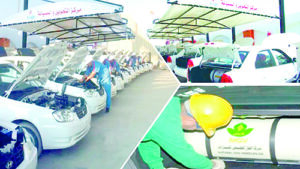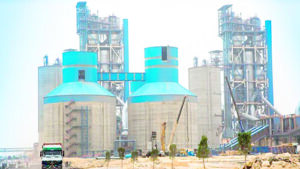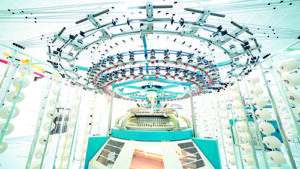The industrial sector has been top priority on the agenda of the Egyptian government over the past year as a driving force of economic development and a pillar of social stability, providing job opportunities for youth, increasing incomes and improving living conditions. This has led to quantum leaps in
Egyptian industry since President Abdel Fattah El Sisi took over in 2014, in terms of achievements, legislation, new investments, horizontal and vertical expansions in new industrial cities and zones, and the rise of exports of all sectors.
Economic reforms
The comprehensive economic reforms President Sisi adopted have made Egypt a Mecca for foreign investments, with its strategic location, stability and an attractive investment climate, particularly in the industrial sector, which contributes 17.1 per cent of GDP and engages 28.2 per cent of the Egyptian workforce, Minster of Trade and Industry Nevine Gamea said.
The minister stressed the president’s directives for carrying on with backing the industrial sector as a strategic approach of the state, taking all measures for localising industries and modern technology to bridge the gap between exports and imports, and achieve self-sufficiency in production inputs to meet the unlimited ambition of industrial development, and creating new jobs.
Gamea referred to comprehensive development in Egypt, of which the foundations have been laid by President Sisi. This has been embodied in scores of grand, national projects and new cities across the nation. The minister also noted a major presidential project for developing the countryside and the “A Decent Life” initiative, which mainly depends on local products.

Trade indexes
Over the past seven years, Egypt’s trade with the world has been on the rise, as exports increased, and imports declined, leading the country’s balance of trade to see positive developments.
Exports increased to $25.3 billion by the end of 2020 from $18.6 billion in 2015, as imports fell to $63.6 billion from $72 billion over the same period. Trade deficit decreased to $38.3 billion by the end of 2020, compared to $53.4 billion in 2014, according to a recent report by the Ministry of Trade and Industry.
Indexes for the first quarter of 2021 has affirmed the positive trend with exports up by 6 per cent to $7.438 billion from $6.990 billion during the corresponding period in 2020.

Industrial parks
As part of an overall development plan, the Ministry of Trade and Industry has aimed to establish 17 industrial parks, with estimated investments of LE10 billion to provide 5,046 units and 48,000 jobs.
Four of these parks have already been completed in Menoufia, Port Said, Alexandria and Cairo, covering pharmaceutical, engineering, food, chemical, plastic industries, and also spinning and weaving.
Last October, the ministry offered seven more of these parks, with 1,457 units in Alexandria, the Red Sea, Beni Suif, Menya, Suhag and Luxor.
Meanwhile, work is proceeding on three industrial cities — the Robiky Tannery City Project (the first phase has been completed), Damietta Furniture City (DFC), and Pharma City in Khanka, northern Cairo, in addition to spinning and weaving in Robiky, where the first stage has already been completed, Gamea said.
Other five industrial zones have been set up in line with the industrial developer system, three in Sadat, Menoufia, and two in 10th Ramadan, with total investments of LE23 billion offering 37,000 new jobs.
Moreover, approvals and licences have already been granted, both for new factories and expansions of existing ones totalling 17,140 industrial facilities with estimated costs of LE44 billion. These cover several sectors such as engineering, electronics, electricity, foodstuff, beverages, building materials, ceramics, spinning and weaving, clothing, leather and chemicals.
Legislation and agreements
Several pieces of legislation and resolutions have been taken over the past seven years as part of relentless efforts to promote the industrial sector. These were topped with issuing the first integrated map of industrial investment, covering the nation’s 27 governorates. The ministry has launched a national project to consolidate local manufacturing, aiming to boost competitiveness of the Egyptian industry, providing local alternatives for imported items, and establishing a strong base of Egyptian suppliers.
In addition, facilities were set up to help small investors obtain units in industrial parks.
Other major steps include the launch of a national programme to transform and replace vehicles to work with clean energy, an agreement to establish a Russian industrial zone in the Suez Canal Axis, east of Port Said, on an area of 5.25 million square metres, and a protocol with a leading world firm for co-operation on technical and vocational training and improving energy efficiency in the industrial sector.
The ministry signed a document with the ministry of parliamentary affairs in Germany for promoting economic partnership between the two countries covering industry, trade policies, investment, power, environment, tourism and infrastructure.
In the meantime, steps to increase foreign trade over the past seven years include among many others the signing of the African Continental Free Trade Area (AfCFTA) agreement and a framework document with Eurasian Economic Union (EAEU) for negotiations on a bilateral free trade, and the agreement on liberalising trade in services among Arab Countries.
Egypt has also signed an agreement with Britain for bilateral trade, guaranteeing stability of economic ties after the UK’s withdrawal from the European Union (Brexit).
The Ministry of Trade and the Japan External Trade Organisation (JETRO) signed a MoU for boosting products and investment opportunities in the Egyptian and Japanese markets.

Exporter backing
Over the past seven years, exporters have been given unmatched support from the state, in response to directives by President Sisi. Total arrears disbursed to exporters hit LE43.4 billion over these years.
The Ministry of Trade and Industry has prepared a new programme to support exporters, as of July 1, 2020, providing cash liquidity to enable them to fulfil their financial obligations.
The new scheme highly considers the radical economic changes that resulted from the pandemic, in addition to contributing to the implementation of the government’s goals in encouraging exports and deepening industries.
At present, the ministry’s Export Development Fund (EDF) is working as hard as ever to overcome the pandemic’s fallout on the economy, and to maintain positive growth rate of the exports, as the top source of foreign currency.
It also seeks to place Egypt on the world’s map of chain of supplies, raising the rate of operation in the various industries, increasing the competitiveness of the Egyptian products on the world markets, and achieving a crucial leap in the local and foreign investments.






Discussion about this post